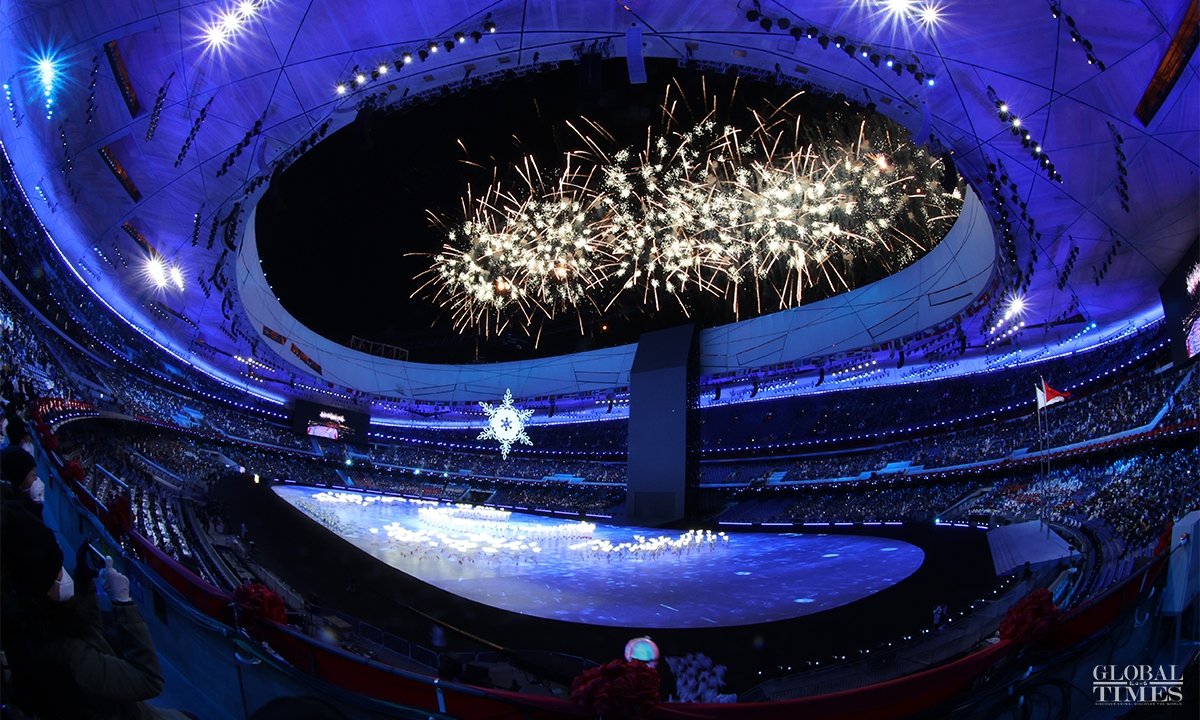China Wins Gold in COVID-19 Restrictions at the 2022 Winter Olympics
The Bird’s Nest transformed into a ice skating rink for the 2022 Winter Olympics. Source: Global Times
Colloquially termed the Bird's Nest for its circular shape, the Chinese National Stadium has seen over 3,000 Winter Olympians display extraordinary athletic feats over the last two weeks. While the athletes seek to bring home a medal, China seeks to prevent a bird's nest of COVID-19. The country reported the first locally-transmitted case of the highly contagious Omicron variant three weeks before the opening ceremony of the global sporting event. Most athletes and foreign nationals currently stay in a closed bubble, similar to the 2020 Summer Olympics in Japan. Nevertheless, officials are wary about Omicron, which has led to record-breaking caseloads and hospital overcrowding in North America and Europe.
In line with the national zero-COVID approach, government officials launched rigorous policies to mitigate the spread of the virus, including city lockdowns and stringent contact tracing protocols. After detecting a case of Omicron, Dongxing – home to 13 million residents — prohibited travel except for essential purposes, while 200,000 residents received lockdown instructions. Yet, Omicron pushed officials to heighten their approach during the holiday season. The pandemic policies coincide with the biggest holiday of China, the Lunar New Year Celebration in early February. The spring holiday typically sees mass numbers of people traveling to hometowns. Indeed, Chinese citizens and foreign nationals of Chinese descent made three billion trips during the 2019 Lunar New Year, making the holiday “the world’s largest annual human migration.” The lockdowns and travel bans coinciding with the holiday season led to discontentment, especially from foreign nationals of Chinese descent. A Chinese-born naturalized American citizen, who chooses to remain anonymous, grumbled that “Lunar New Year is a time to be together with family. I understand that the pandemic response comes first, but I cannot help but feel frustrated because I have not seen my family for almost three years.”
But, the Winter Olympics add an extra layer of scrutiny for China. Officials see the sporting event as an opportunity to show that China is capable, especially amidst a pandemic that originated in Wuhan. Foreign nations criticized China’s initial COVID-19 policy and claimed that an earlier response might have mitigated the global health fiasco. For example, Australia pushed for an independent investigation into the origins of COVID-19, and the Republican Party in the United States backed such an approach. “A successful Winter Olympics would be a public image boon for China, especially when everyone has come to associate the coronavirus with Chinese mismanagement,” according to an anonymous source. Another source agreed with the statement: “The Olympics are a time when foreign cameras are watching China. China cannot afford to lose face.” Indeed, foreign policy analysts term this “Olympic diplomacy”, or the ability of a nation to gain soft power and an elevation of public relations during the Olympics. Specifically, China aspires for a repeat of the 2008 Beijing Summer Olympics. “The Bird’s Nest and the Water Cube were built for the 2008 Olympics,” explains a source. “Officials wanted to show the world a modernized China, especially after the accession to the World Trade Organization in 2001."
Yet, eliminating COVID-19 cases is no easy feat, especially amidst the Omicron wave. China chose to forgo tourism revenue and ban all spectators, even domestic citizens. Foreign athletes, media correspondents, and local service workers live in a closed-off bubble with no outside contact. They have separate hospitality, housing, and even transportation via high-speed rail. Additionally, athletes must undergo daily testing and are required to isolate until two negative test results if they contract the virus. Indeed, American bobsledder Elana Meyers Taylor could not act as flag bearer during the opening ceremony after testing positive. Over 400 people in the Olympic closed-loop have tested positive to this date, including 180 athletes – possibly dashing their hopes at medaling. Overall, China had 915 cases from January 30 to February 15, meaning that the cases related to the Olympics constitute almost half of the national caseload. So far, little backlash has come from the public. “It is inevitable for cases to increase, but there are restrictions in place,” comments an anonymous source. However, public opinion may change if the case numbers rapidly rise. History shows that domestic citizens may feel discontent if they believe that officials are sacrificing public health for the entertainment of foreigners. The government of Japan, in particular, faced heated backlash when they agreed to continue with the 2021 Summer Olympics amidst a wave in cases, leaving 78% of citizens disapproving of the Olympics.
As the previous three years have shown, COVID-19 is a fickle and perplexing virus, often impacting a nation more than others due to unapparent reasons. China attempts to quell any domestic backlash or international humiliation through pandemic restrictions, yet the success of their attempts – similar to any governmental effort to quell the pandemic – partially rests on chance and luck. At the time of writing, China has four gold medals, but a source explains that “China definitely takes home gold in COVID-19 restrictions.”

